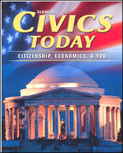
Civics Today Citizenship, Economics, & YouChapter 17: Citizenship and the InternetChapter OverviewsThe Internet is a mass communication system of millions of networked computers and databases all over the world. The World Wide Web operates within the Internet. Citizens use the Internet to stay informed on current events. Many parts of the federal, state, and local governments also have Web sites. By visiting sites of the major political parties, citizens can learn more about candidates and their stands on important issues. Many people thought that the free flow of information and ideas on the Internet would lead to the spread of democracy. Some authoritarian countries have found ways to limit online communications. Extremist groups and hate groups have also found that the Internet allows them to find one another and band together electronically. The U.S. government and law enforcement officials struggle with the issues of protecting the public and the citizens' rights to privacy. Lawmakers have tried to enact laws censoring some online speech. The Supreme Court, however, has held that speech on the Internet should have the highest level of First Amendment protection. Other battles have been fought over intellectual property and copyright protection. |  |















